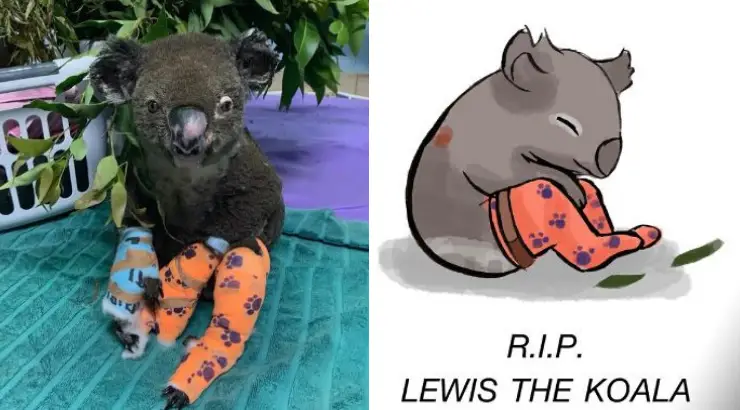Animals
Lewis the Koala, Who Drew Worldwide Attention After Rescue, Has Tragically Died
Lewis the koala—who was rescued from Australia’s horrific wave of bushfires—has sadly died.

(TMU) — A koala who drew global attention after being rescued from Australia’s horrific wave of bushfires has died after it became clear that his burns were not going to improve.
The marsupial, dubbed Ellenborough Lewis, had been taken to the Port Macquarie Koala Hospital last week after a woman daringly rescued him from one of the several wildfires engulfing the state of New South Wales.
I know there is a lot going on in the world but I’m gutted by the news that Lewis the koala – who was rescued from the Australian bush fires – has sadly died from the injuries he sustained ?? pic.twitter.com/CiNKOwQFVN
— Dan Walker (@mrdanwalker) November 26, 2019
On Tuesday, the koala hospital made the heart-rending decision to euthanize Lewis after an inspection of his wounds, which were not improving, the hospital said in a post to Facebook.
The hospital wrote:
“Today we made the decision to put Ellenborough Lewis to sleep. We placed him under general anesthesia this morning to assess his burns injuries and change the bandages.
We recently posted that ‘burns injuries can get worse before they get better.’ In Ellenborough Lewis’s case, the burns did get worse, and unfortunately would not have gotten better.
The Koala Hospital’s number one goal is animal welfare, so it was on those grounds that this decision was made.”
Today we made the decision to put Ellenborough Lewis to sleep. We placed him under general anaesthesia this morning to…
Posted by Koala Hospital Port Macquarie on Monday, November 25, 2019
On Saturday, the hospital warned that it was considering taking the step of ending Lewis’ life after it had been determined that the 14-year-old koala’s “injuries and his pain are not treatable and tolerable.”
Lewis had gone viral after dramatic footage emerged of a woman running into a raging brushfire to save him. Video showed the koala, badly burned with patches of fur missing, running near the fires before the woman, Toni Doherty, saved him by pouring bottles of water on him and wrapping him in a blanket.
Doherty later told 9 News:
“The poor koala, he was crying and screaming, because he was being burnt. He was burning underneath, on his little back legs… I’ve never heard a koala before. I didn’t realise they could cry out. It was just so heart-rendering.”
Lewis’ death comes as some experts warn that anywhere from several hundred to over one thousand koalas have died in the fires sweeping over New South Wales and Queensland over the last two months.
In Port Macquarie alone, it is estimated that 350 koalas have died out of a population of 600.
Christine Adams-Hosking, a postdoctoral research fellow at the University of Queensland in Australia, told National Geographic:
“They’re such helpless little things.
A bird can fly, a kangaroo can hop very fast, but koalas are so slow. They basically just get stuck where they are.”
Last week the Mind Unleashed reported that Deborah Tabart, the chairman of the Australian Koala Foundation, warned that the koala population is “functionally extinct” due to the difficulties of the species recovering from the fire.
The Port Macquarie Koala Hospital and other experts disagreed with Tabart’s assessment, however, which they see as far too alarmist.
Wildlife conservationist Chris Johnson said:
“We’re not going to see koalas go extinct this fast.
Koala populations will continue to decline because of lots of interacting reasons, but we’re not at the point where one event could take them out.”
Ellenborough Lewis, the koala that was saved from a New South Wales bushfire by a woman, has been put to sleep in a hospital due to his extensive burns on November 26, 2019.#ThaiPBSWorld #RIPLewis pic.twitter.com/6x7YLOCp7B
— Thai PBS World (@ThaiPBSWorld) November 26, 2019
While the Port Macquarie Koala Hospital’s assistant clinical director Scott Castle said:
“Koalas are not functionally extinct across Australia. In the regions that have been fire-affected we won’t know the full extent to changes in population dynamic until they are properly surveyed.
It’s far too broad to say they are functionally extinct.”
By Elias Marat | Creative Commons | TheMindUnleashed.com
Typos, corrections and/or news tips? Email us at Contact@TheMindUnleashed.com
